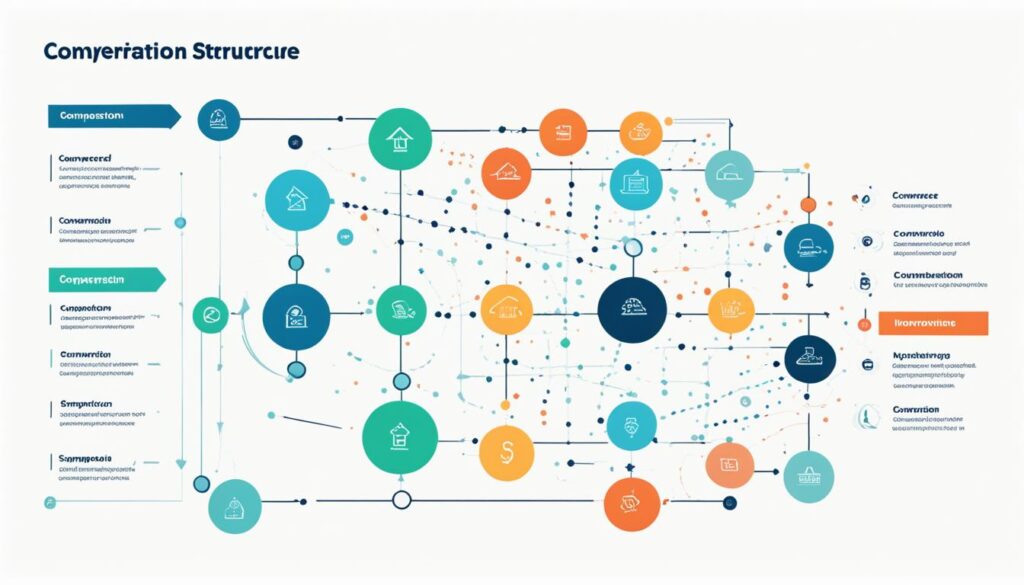The venture capital (VC) industry may seem glamorous, with its promises of backing visionary entrepreneurs and reaping the rewards of successful startup investments. However, according to industry insiders, the reality of working in VC is far more complex. Is the VC lifestyle truly as exciting as it’s made out to be, or is there more to the story?
Delving into the inner workings of the VC world, we uncover a “tiny asset class” where competition for the best startups is fierce and promotion paths are limited. With few partners and additional investors in most VC firms, the industry is small and navigating its hierarchy can be challenging. As the venture capital landscape evolves, it’s crucial to understand the realities of this dynamic field and whether a career in VC is truly as fun and rewarding as it may seem.
Key Takeaways
- The venture capital industry is a small, competitive field with limited promotion opportunities.
- VC firms typically have few partners, making it challenging to advance within the hierarchy.
- Fierce competition exists for investment in the top startups and visionary entrepreneurs.
- The glamour of VC may not always match the day-to-day realities of the job.
- Understanding the pros and cons of a VC career is essential for those considering this path.
The Venture Capital Career Path
The venture capital industry offers a diverse range of career opportunities, from entry-level analyst roles to senior partner positions. According to industry insights, there are three primary entry points into this dynamic field: pre-MBA, post-MBA, and senior-level.
Entry Points: Pre-MBA, Post-MBA, and Senior Level
Pre-MBA candidates often have backgrounds in investment banking, management consulting, or startup business development, sales, or product management. Their hands-on experience in these related fields provides a strong foundation for transitioning into the venture capital career path.
Post-MBA candidates, on the other hand, typically have prior experience in tech, healthcare, or finance before attending a top business school. This educational and professional combination makes them well-suited for the analytical and strategic demands of a VC career ladder.
At the senior level, individuals with a successful entrepreneurial track record or extensive executive experience at large companies may enter the venture capital industry. Their VC job roles often involve driving deals, shaping firm strategy, and leveraging their extensive venture capital hierarchy of connections.
Hierarchy: Analysts to General Partners
The VC entry levels within a venture capital firm typically range from Analysts to General Partners. Analysts, often recent college graduates, tackle a significant amount of research, due diligence, and support work. As they progress, they may become Associates, Principals, and eventually, Partners or General Partners, assuming greater responsibility for sourcing deals, managing portfolios, and shaping the firm’s strategic direction.

Daily Responsibilities of Venture Capitalists
As the gatekeepers of the venture capital industry, VC professionals wear many hats and juggle a diverse set of responsibilities on a daily basis. According to industry experts, the primary duties of a venture capitalist can be broadly categorized into three key areas: sourcing and deal execution, portfolio company support and networking, and fundraising and LP relations.
Sourcing and Deal Execution
A significant portion of a VC’s time is dedicated to scouring the market for promising startup investment opportunities. This VC deal sourcing process involves attending industry events, networking with founders, and carefully reviewing business plans and pitch decks to identify the most innovative and scalable ventures. Once a potential investment is identified, venture capitalists then dive deep into the due diligence process, analyzing the startup’s financials, business model, and competitive landscape to assess the risks and potential returns.
Portfolio Company Support and Networking
After making an investment, venture capitalists play an active role in supporting their portfolio companies. This includes providing strategic guidance, leveraging their industry connections to facilitate partnerships and talent recruitment, and closely monitoring the startup’s progress and performance. Venture capitalists also spend a considerable amount of time building and maintaining their professional networks, which are crucial for both sourcing new deals and supporting existing portfolio companies.
Fundraising and LP Relations
In addition to their deal-related responsibilities, venture capitalists must also dedicate a significant portion of their time to VC fundraising activities. This involves raising capital from limited partners (LPs), such as institutional investors, high-net-worth individuals, and family offices, to fund the VC firm’s investment activities. Maintaining strong relationships with these LPs and providing them with regular updates on fund performance and portfolio company progress is essential for a venture capitalist’s success.

Compensation Structure in Venture Capital
Understanding the compensation structure in the venture capital (VC) industry is crucial for aspiring professionals seeking a career in this dynamic field. According to industry insights, the typical VC compensation package consists of three key components: base salaries, year-end bonuses, and the highly sought-after carried interest (or “carry”).
Base Salaries and Bonuses
VC professionals, ranging from analysts to partners, generally receive competitive base salaries that align with their experience and seniority within the firm. These base salaries provide a stable foundation for their compensation. In addition to the base pay, VC firms often reward their top performers with year-end bonuses, which can significantly boost the overall compensation package.
The Elusive Carry (Carried Interest)
The most lucrative and elusive component of VC compensation is the carried interest, or “carry.” This performance-based incentive allows VC professionals to share in the profits generated by the investments they help manage. Carry is typically distributed to the general partners (GPs) of a VC firm, who have a direct stake in the success of the fund’s investments. Earning a sizable carry can substantially increase a VC professional’s overall compensation, making it a highly coveted and competitive aspect of the industry.
Understanding the nuances of venture capital compensation, VC salaries, VC bonuses, and the role of carried interest in VC is essential for those seeking to thrive in this fast-paced and rewarding industry.

Venture Capital Analyst: The Entry-Level Role
The venture capital analyst role is often the starting point for many aspiring professionals looking to break into the dynamic world of venture capital. As the most junior members of a VC firm, these VC analysts play a crucial part in supporting the firm’s investment activities and deal execution processes.
Responsibilities and Compensation
As a VC analyst, your primary responsibilities will involve a significant amount of number crunching, industry research, and support work to assist the firm’s associates with due diligence and internal processes. This includes tasks such as financial modeling, competitive analysis, market research, and synthesis of key findings to inform investment decisions.
In terms of compensation, VC analyst salaries typically range from around $60,000 to $100,000 per year, with the potential for year-end bonuses. However, it’s important to note that the VC analyst compensation structure is notably lower compared to that of investment banking, private equity, or hedge fund roles.
Promotion Timelines and Next Steps
The VC analyst career path often involves a relatively short tenure, as many analysts typically transition out of the role within a few years to pursue other opportunities. This could include joining a portfolio company, pursuing an MBA, or transitioning into a pre-MBA associate position within the venture capital industry.
For those who excel in the VC analyst role and demonstrate a strong passion for startups and venture investing, there may be opportunities to progress within the firm, potentially moving into more senior positions such as pre-MBA or post-MBA associate roles.

Venture Capital Associate: The Pre-MBA Role
The venture capital associate role is a critical pre-MBA position that serves as a stepping stone into the dynamic world of venture capital. These associates often possess prior experience in industries closely aligned with VC, such as investment banking, management consulting, or startup business development, sales, and product management.
Sourcing, Deal Execution, and Portfolio Support
As a venture capital associate, individuals are responsible for a diverse range of tasks that support the firm’s investment activities. This includes sourcing promising venture capital associate role opportunities, conducting thorough due diligence on potential investments, and providing ongoing support to the portfolio companies within the VC’s network.
Compensation and Promotion Prospects
Compensation for VC associates is generally competitive, with a base salary typically ranging from $100,000 to $150,000, coupled with a year-end bonus that can significantly boost their total earnings. However, it’s important to note that VC associate compensation tends to be lower compared to other finance roles, such as investment banking or private equity.
The pre-MBA associate career path in venture capital offers promising promotion prospects, with many associates transitioning to the associate or principal level after a successful tenure. This trajectory allows them to take on increased responsibilities, deepen their industry expertise, and potentially progress towards the coveted general partner role at a later stage.

Senior Roles: Principals, Partners, and General Partners
Within a venture capital firm, the senior roles include Principals, Partners, and General Partners. These more experienced professionals are typically individuals who have demonstrated a successful entrepreneurial track record or extensive executive experience at large companies. They play a pivotal role in driving the firm’s investment strategy and deal flow.
Driving Deals and Firm Strategy
VC principals and partners are responsible for sourcing and evaluating promising investment opportunities, conducting thorough due diligence, and making the final decisions on which startups to back. They leverage their deep industry knowledge, extensive networks, and keen market insights to identify high-potential ventures aligned with the firm’s investment thesis. VC principals often have a more hands-on role in supporting portfolio companies, working closely with founders to help them navigate challenges and achieve their growth objectives.
The Rolodex: Key to Success
In the venture capital industry, a robust network and connections within the startup ecosystem are essential. VC partners and principals leverage their extensive “rolodex” of contacts to source deals, attract limited partner (LP) investments, and provide valuable support to their portfolio companies. Building and maintaining these relationships through networking events, social media platforms like LinkedIn, and personalized outreach can be a key driver of success for senior VC professionals.
| Role | Responsibilities | Decision-Making Authority |
|---|---|---|
| General Partner | Responsible for fundraising, setting the firm’s investment strategy, and making final investment decisions. | Hold the highest level of decision-making authority within the VC firm. |
| Partner | Involved in deal sourcing, due diligence, and portfolio management, but typically focus more on strategic decisions rather than day-to-day operations. | Have significant influence over investment decisions, but may not hold the ultimate authority like general partners. |
| Principal | Play a more hands-on role in supporting portfolio companies, assisting partners with deal sourcing, due diligence, and portfolio management. | Provide recommendations and insights to partners, but do not have final decision-making power. |
Conclusion
As we’ve explored, the venture capital industry offers a unique and potentially rewarding career path for those with a deep passion for startups and innovation. According to the third source, the “true reward” of working in VC lies in the opportunity to “collaborate with visionary founders” and be a part of building “game-changing” companies.
Passion for Startups: The True Reward
For those drawn to the venture capital industry, the chance to work alongside pioneering entrepreneurs and shape the future of emerging technologies can be a truly fulfilling experience. As the individual in the provided details mentions, the opportunity to attend demo days and evaluate numerous investment opportunities underscores the excitement and dynamism of this field.
Weighing the Pros and Cons
Of course, the venture capital career path is not without its challenges. The individual notes experiencing imposter syndrome, highlighting the fierce competition and high expectations within the industry. However, they also emphasize how such experiences can lead to personal growth and development, ultimately strengthening one’s skills and resilience. The importance of networking, becoming a generalist, and honing soft skills like negotiation and pitching are also key takeaways that aspiring venture capitalists must consider. As the individual’s experience shows, navigating the venture capital career path requires a blend of passion, adaptability, and a willingness to continuously learn and improve.
In the end, the venture capital industry offers a unique opportunity for those who are driven by the thrill of discovering and supporting the next generation of groundbreaking companies. While the journey may not be without its challenges, the rewards of being at the forefront of innovation and entrepreneurship can be truly extraordinary.
